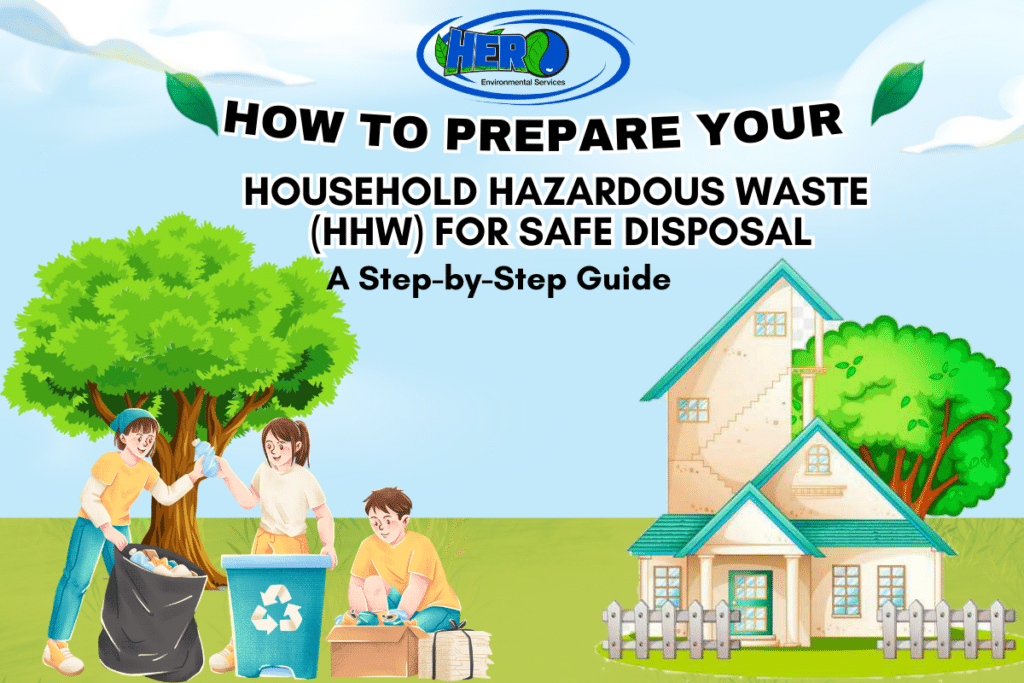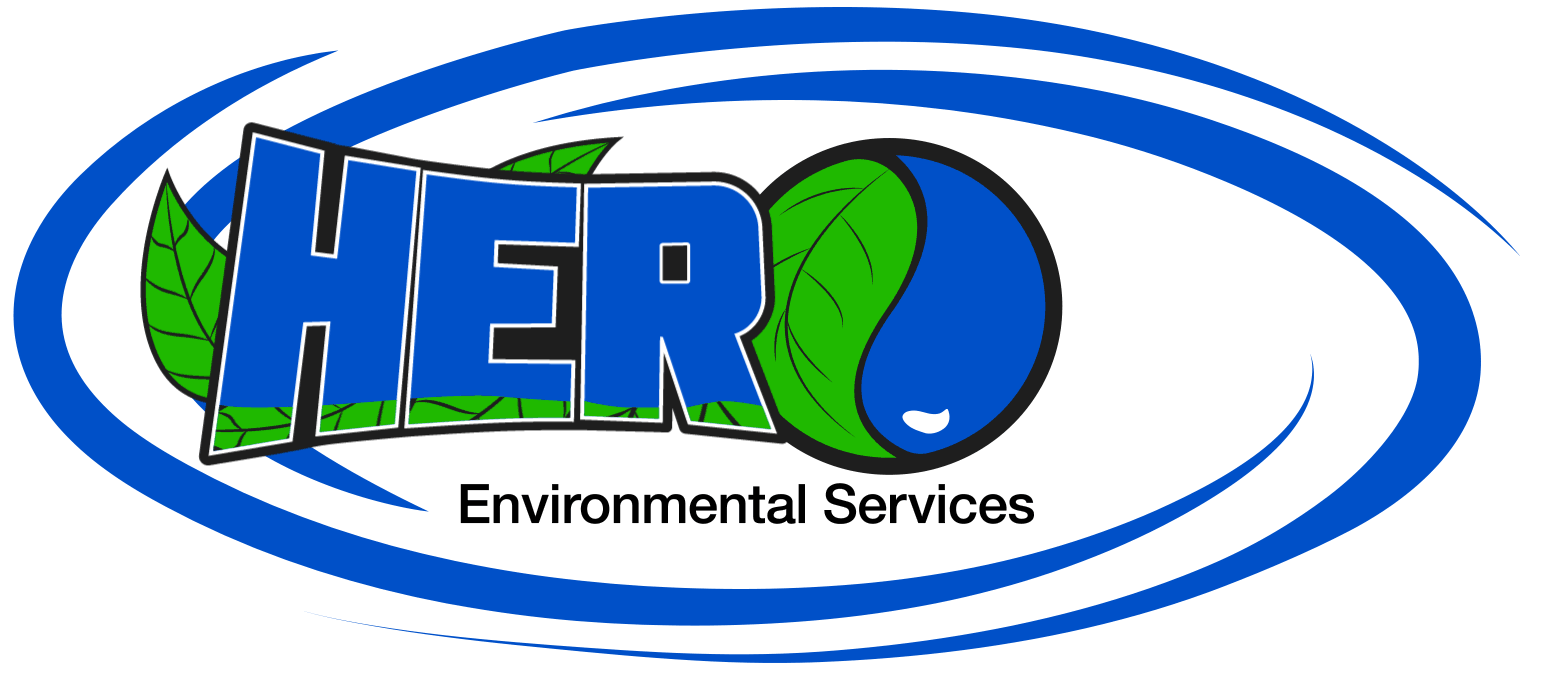How to Prepare Your Household Hazardous Waste(HHW) for Safe Disposal – A Step-by-Step Guide

Most of the unwanted materials generated through daily human activities are considered waste and are typically discarded because they serve no further purpose in your home. However, all wastes are not similar and can’t be treated in the same way. Some wastes can be toxic, corrosive, flammable, or explosive. Such wastes are known as hazardous waste.
Household Hazardous Wastes (HHW) require special treatment and shouldn’t be disposed of in your regular trash bins or garbage pits because of the potential risk they can pose to the people around you and the environment. You need to prepare all the HHW for proper disposal.
This blog provides you with some tips on hazardous waste management so you can prepare for HHW disposal.
Most Common Household Hazardous Waste in Your Home
Did you know that many daily-use products contain hazardous chemical ingredients? If such products cross their expiry date or are mishandled, they can be dangerous. Disposing of such hazardous wastes in public places is illegal. Therefore, you must be aware of what products in your household could turn into hazardous waste over time.
Usually, the products that are flammable, toxic, corrosive, or reactive are hazardous and must be used and disposed of with great caution. Have you ever used any product and thought, “Wow, this stuff is strong!”? That’s probably HHW!
- Paints and paint thinners contain lead and other volatile organic compounds (VOCs).
- Automotive fluids (antifreeze, motor oil) contain ethylene glycol, propylene glycol, or polyfluoroalkyl substances.
- Cleaning products (bleach, ammonia). Bleach is composed of sodium hypochlorite.
- Pesticides and herbicides are composed of various chemicals, including organochlorines, organophosphates, carbamates, and synthetic pyrethroids.
- Batteries (both rechargeable and alkaline) have a high percentage of mercury, lead, cadmium, and lithium.
- Fluorescent bulbs and tubes usually have mercury and phosphor.
- Expired medicines themselves degrade into harmful compounds over time.
- Pool chemicals include chlorine-based disinfectants, acids like muriatic acid, and other chemicals like sodium bicarbonate.
- Nail polish remover or hair dye contains chemicals like acetone, toluene, formaldehyde, and phthalates.
All these items and other similar products need to be managed properly before disposal. Improper hazardous waste management can lead to soil and water contamination, air pollution, harm to sanitation workers, fires, explosions, or toxic fumes. Even if it’s just a little, the damage can multiply quickly. That’s why preparing hazardous waste for disposal is such an important responsibility.
How to Prepare Household Hazardous Waste for Safe Disposal?
Let’s learn to deal with household hazardous wastes!
1. Identification of Hazardous Materials
Always check the products’ labels for any warning signs. It mentions the composition and other details about the product, which is helpful in identifying hazardous materials.
- The composition may include any hazardous or toxic chemicals.
- Words like “Danger,” “Caution,” “Toxic,” “Flammable,” or “Corrosive” are red flags.
- There could be some precautionary statements, like – “Keep away from the reach of children” or “Do not get into the eyes.”
- Any directions for using and storing the product indicate its hazardous properties. For example- “Store in a cool, dry place” or “Use within 30 days.”
- Sometimes the product also mentions some precautionary tips like – “Use on a small area first” or “Don’t use directly on face.”
2. Keep Products in Original Containers
Never transfer any hazardous substance into food containers or any other bottle or jar, even if the original one looks beat up. The original container has all the details about its composition and warning signs mentioned on it. When you pour it into another container, you miss the precautionary guidelines there. If it’s very urgent, then paste the original label on it for safe use and disposal.
3. No Mixing With Other Compositions
You might find it easy or helpful to mix up the leftover substances like paints or cleaners. But it can create dangerous chemical reactions. Even products that seem similar can behave unpredictably when combined.
Moreover, mixing the wrong products can cause dangerous reactions; they might catch fire, explode, or become too contaminated to recycle safely.
4. Seal Containers Properly
If the hazardous substance has reached its expiry date or only a little amount is left and is of no use to you, don’t throw it right away.
- All HHW containers must be tightly closed so they don’t leak.
- If a container is cracked or compromised, place it in a secondary container so it won’t spill during transport.
- Never overfill containers with leftover liquids “just to finish them off.” Leave a little space for expansion, especially during hot weather.
5. Sorting and Grouping
When preparing hazardous waste for disposal, the best way is to group similar items. For example, keep all batteries in one container, automotive fluids in another, and so on. This makes processing easier and safer when you drop them off.
6. Safe Storage
Can’t get to a disposal site right away? No problem! Just keep the HHW out of reach of children and pets, in a cool, dry place, and away from any flames or heat sources. This will prevent your family and surroundings from the potential dangers of HHW.
7. Contact a Certified Disposal Facility
Don’t take the risk of transporting HHW to the right destinations. Always seek help from a certified and trusted Household Hazardous Waste Disposal service in your area. A professional HHW disposal team can make it easy, safe, and convenient to drop off your HHW.
| Need Household Hazardous Waste Disposal? Call Now! |
Takeaway
Improper disposal of any hazardous waste has dangerous outcomes. They can contaminate groundwater, damage the sewage system, poison wildlife, and pollute the air. The biggest challenge is to identify and isolate the HHW. Once you understand the basic points to consider, it will be easier for you to prepare household hazardous wastes for disposal. Contact a professional HHW disposal agency for expert assistance and peace of mind.
Don’t Let Your Household Hazardous Waste Become a Hazard – Contact Hero Environmental Services for Good!
If you are looking for household hazardous waste disposal in Reno, trust Hero Environmental Services. We are the most responsive environmental service provider in Reno. We provide services for hazardous and non-hazardous waste transport and disposal, industrial cleaning and remediation, environmental field services, soil remediation, and trash compactor cleaning.
We’re available 24/7, so you can call us anytime. Our staff is trained and experienced to perform all waste disposal activities safely and efficiently.
Call us at 775-900-HERO for safe HHW disposal today!.

